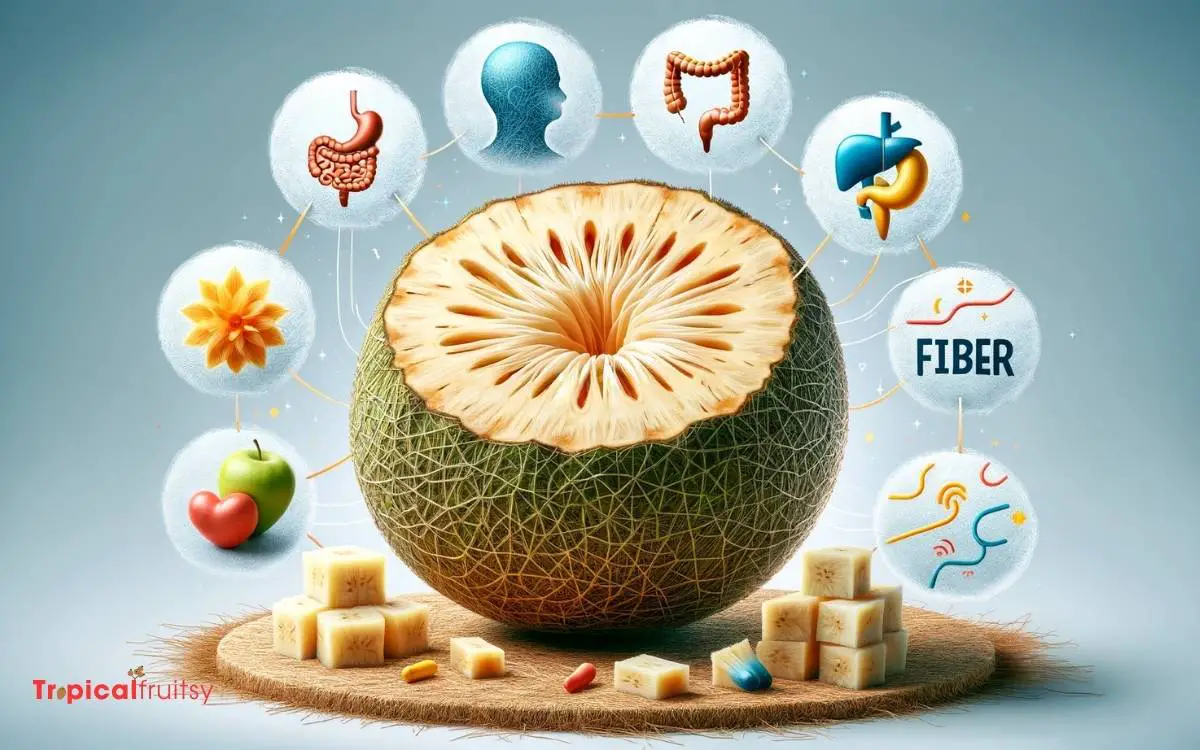Is Breadfruit High in Carbohydrates? Explore!
Breadfruit is indeed high in carbohydrates, predominantly in the form of complex carbs. A medium-sized breadfruit (about 220 grams) contains approximately 60 grams of carbohydrates.
This includes a good amount of dietary fiber, contributing to its various health benefits and making it a filling, energy-rich food choice.
Breadfruit’s carbohydrates are largely complex, which means they are broken down slowly by the body, offering a more sustained energy release compared to simple sugars.
Here’s a breakdown of its carbohydrate content:
While high in carbohydrates, breadfruit also contains other essential nutrients such as vitamin C, potassium, and antioxidants.
Rich in complex carbohydrates, breadfruit is an energy-dense food that supports a balanced diet, particularly in tropical regions.

Key Takeaway
Breadfruit Nutritional Profile (Per 100g)
| Nutrient | Amount per 100g |
|---|---|
| Total Carbohydrates | 27.12g |
| Dietary Fiber | 4.9g |
| Sugars | 11g |
| Starch | 11.22g |
| Calories | 103 kcal |
| Protein | 1.07g |
| Total Fat | 0.23g |
| Vitamins and Minerals | Various (Including Vitamin C, Potassium, etc.) |
Understanding Breadfruit

Breadfruit, scientifically known as Artocarpus altilis, is a tropical fruit that serves as a staple food in many cultures due to its rich carbohydrate content.
Originating from the South Pacific and eventually spreading to other tropical regions, breadfruit is now cultivated worldwide.
It is esteemed for its versatility and nutritional value, particularly as a source of energy. The starchy flesh of breadfruit is comparable to other carbohydrate-dense foods like potatoes and can be prepared in a variety of ways – from boiled to fried or baked.
Nutritionally, breadfruit is not only high in carbohydrates but also provides dietary fiber, vitamins, and minerals, presenting a balanced option for sustenance in the diets of those living in tropical climates.
Carbohydrate Content Analysis

Commonly consumed in tropical regions, breadfruit contains a significant amount of carbohydrates, typically comprising the majority of its caloric content.
A detailed examination of the carbohydrate profile is essential for understanding its nutritional impact.
| Nutrient | Amount per 100g | % Daily Value* |
|---|---|---|
| Total Carbohydrates | 27.12 g | 9% |
| Dietary Fiber | 4.9 g | 19% |
| Sugars | 11 g | – |
| Starch | 12.22 g | – |
The table above provides a snapshot of the carbohydrate content in breadfruit. It is evident that breadfruit is rich in complex carbohydrates, which include both fibers and starches, as well as natural sugars.
The fiber content is particularly noteworthy, as it contributes to satiety and has various health benefits.
Understanding breadfruit’s carbohydrate makeup allows for better dietary planning, especially for individuals monitoring their carbohydrate intake.
Comparing Breadfruit to Other Fruits

When assessing the carbohydrate content of breadfruit, it is essential to place it in context by comparing it with other commonly consumed fruits.
Factors such as glycemic index variation are also crucial, as they influence blood sugar levels and can affect dietary choices for individuals with conditions like diabetes.
Additionally, a nutritional value contrast will highlight the broader health implications of incorporating breadfruit into one’s diet.
Carbohydrate Content Comparison
To objectively assess whether breadfruit is high in carbohydrates, it is essential to compare its carbohydrate content with that of other commonly consumed fruits.
Breadfruit contains approximately 27 grams of carbohydrates per 100-gram serving. In contrast, bananas, known for their high carbohydrate content, have about 23 grams per 100 grams.
Apples, another popular fruit, have roughly 14 grams, while berries, such as strawberries, offer a lower carbohydrate count of about 8 grams per 100 grams.
The comparison reveals that breadfruit does have a higher carbohydrate content relative to many fruits.
However, it is important to consider the nutritional context in which these carbohydrates are consumed, as breadfruit also provides dietary fiber, vitamins, and minerals, contributing to a balanced diet.
Glycemic Index Variation
Considering its glycemic index, breadfruit exhibits a moderate score that can vary depending on its ripeness and preparation, typically ranging from 50 to 65, which is comparable to bananas but lower than some other high-carbohydrate fruits.
This variability underscores the importance of considering the glycemic index as part of dietary planning, particularly for individuals managing blood sugar levels.
To evoke a deeper understanding, here is a comparison table showcasing the glycemic index of breadfruit relative to other common fruits:
| Fruit | Glycemic Index | Emotional Trigger |
|---|---|---|
| Breadfruit | 50 – 65 | Moderate, Manageable |
| Banana | 51 | Comparable, Familiar |
| Watermelon | 72 | Higher, Cautionary |
| Apple | 36 | Lower, Reassuring |
| Pineapple | 59 | Similar, Reflective |
This evidence-based approach illustrates the relative standing of breadfruit among fruits, providing a clear context for its consumption within a balanced diet.
Nutritional Value Contrast
The carbohydrate content of breadfruit, when compared to other starchy fruits, is relatively high, making it a significant source of energy in many diets where it is incorporated as a staple food.
For instance, breadfruit contains about 27 grams of carbohydrates per 100-gram serving, which is more than what you’d find in the same serving of bananas, at approximately 22 grams.
However, it is lower than in foods like white potatoes, which boast about 17 grams per 100 grams.
Such comparisons are crucial for those managing their carbohydrate intake, as they offer a broader perspective on how breadfruit fits into a balanced diet.
Understanding the carbohydrate levels in breadfruit can help inform dietary choices, especially considering the role of fiber in breadfruit, which we will explore next.
The Role of Fiber in Breadfruit

Within the carbohydrate content of breadfruit, dietary fiber plays a crucial role in moderating the body’s absorption of sugars and contributing to digestive health.
The dietary fiber in breadfruit is not just a single nutrient, but a complex ensemble with multiple health benefits.
To visualize the impact of fiber in breadfruit, consider the following:
- Regularity: Fiber aids in preventing constipation by adding bulk to stool.
- Blood Sugar Control: It slows glucose absorption, aiding in managing blood sugar levels.
- Satiety: High-fiber foods like breadfruit can help you feel full longer.
- Cholesterol Management: Certain fibers can bind to cholesterol in the digestive system, reducing its absorption.
- Gut Health: Fiber serves as a prebiotic, promoting the growth of beneficial gut bacteria.
The fiber in breadfruit exemplifies how a single component of a food can influence various aspects of health.
Breadfruit in Low-Carb Diets

When considering the inclusion of breadfruit in low-carb diets, it is crucial to assess its carbohydrate content in relation to daily dietary allowances.
Breadfruit’s compatibility with stringent low-carb eating plans, such as the ketogenic diet, hinges on its net carb count after fiber subtraction.
For those seeking lower carbohydrate options, exploring breadfruit flour alternatives may offer a more suitable fit within carbohydrate-restricted meal planning.
Carb Content Analysis
Analyzing the carbohydrate content of breadfruit is essential for determining its compatibility with low-carb diets.
As individuals seek to adhere to such dietary regimens for health or weight management reasons, understanding the carb profile of potential food items becomes critical.
Breadfruit’s carbohydrate characteristics can be summarized as follows:
- High in complex carbohydrates, providing sustained energy.
- Contains dietary fiber, beneficial for digestive health.
- Offers a moderate glycemic index, affecting blood sugar levels.
- Rich in vitamins and minerals, despite its carb content.
- Comparatively lower in carbs than some staple grains and tubers.
Considering these points, breadfruit may be integrated into a low-carb diet with careful planning and portion control.
Keto Diet Compatibility
Considering its carbohydrate profile, breadfruit may present challenges for strict adherence to a ketogenic diet, which typically restricts daily carb intake to fewer than 50 grams.
The ketogenic diet demands a significant reduction in carbohydrate intake, shifting the body’s energy reliance from glucose to ketones, produced from fats.
Breadfruit, with its relatively high carbohydrate content, could easily surpass the carb limit with just a single serving.
This can potentially interrupt the metabolic state of ketosis, which is the cornerstone of the ketogenic dietary approach.
Therefore, individuals following a ketogenic lifestyle must carefully account for the carbs in breadfruit or consider alternative foods that align better with the low-carb, high-fat macronutrient distribution required for sustained ketosis.
Breadfruit Flour Alternatives
Acknowledging the high carbohydrate content of breadfruit, individuals adhering to low-carb diets might explore flour alternatives that better align with their nutritional goals.
For those seeking to maintain the texture and culinary versatility similar to breadfruit flour without the high carb count, a variety of substitutes are available.
These alternatives offer not only reduced carbohydrate levels but also diverse nutritional benefits.
- Almond Flour: A low-carb, gluten-free option rich in protein and healthy fats.
- Coconut Flour: High in fiber and suitable for those with nut allergies.
- Flaxseed Meal: Offers omega-3 fatty acids and fiber while being low in carbs.
- Chia Flour: Provides a good source of antioxidants and minerals, with a low glycemic index.
- Soy Flour: Contains complete protein and is beneficial for heart health.
These options enable individuals to enjoy baking and cooking endeavors that align with their dietary restrictions.
Preparing Breadfruit for Lower Carbs

While breadfruit inherently contains a significant amount of carbohydrates, certain preparation methods may reduce its carb content.
For example, fermenting breadfruit can alter its carbohydrate profile, as the process may break down some starches into simpler sugars that are then consumed by bacteria, potentially decreasing the net carb count.
Additionally, combining breadfruit with foods high in fiber or fat could slow the digestion and absorption of carbohydrates, thus moderating blood sugar spikes.
It’s important to note, however, that these methods do not drastically lower the carbohydrate content, but they may help manage the glycemic load.
When aiming to reduce carbs, it is essential to consider the overall dietary context in which breadfruit is consumed.
Does Breadfruit’s Nutrient Content Outweigh Its Carbohydrate Content for Diabetics?
Some argue that breadfruit’s nutrient content outweighs its carbohydrate content for diabetics, making it a potential breadfruit for diabetes solution. While it is high in carbohydrates, it also contains fiber, vitamins, and minerals that could benefit those with diabetes when incorporated into a balanced diet.
Overall Health Benefits of Breadfruit

Nutritionally dense and packed with vitamins and minerals, breadfruit offers numerous health benefits beyond its carbohydrate content.
This tropical staple, while rich in energy-providing carbs, also boasts a range of nutrients that contribute to overall wellness.
Here are some of the key health advantages of incorporating breadfruit into your diet:
- Rich in Fiber: Supports digestive health and helps maintain a healthy gut.
- High in Potassium: Aids in maintaining normal blood pressure and heart function.
- Antioxidant Properties: Contains vitamins C and A, which help protect against oxidative stress and inflammation.
- Low in Fat: Promotes a heart-healthy diet with its minimal fat content.
- Gluten-Free: Provides a nutritious alternative for those with gluten sensitivities or celiac disease.
Breadfruit’s multifaceted nutritional profile makes it a beneficial addition to a balanced diet.
Conclusion
Breadfruit emerges as a nourishing staple, rich in carbohydrates yet beneficial due to its dietary fiber content.
While it may not be ideal for strict low-carb diets, its inclusion can be justified by its overall nutritive value. Thoughtful preparation methods can mitigate its carbohydrate impact.
Ultimately, breadfruit stands as a symbol of tropical abundance, its lush bounty offering a tapestry of health benefits wrapped in its starchy, fibrous flesh.






